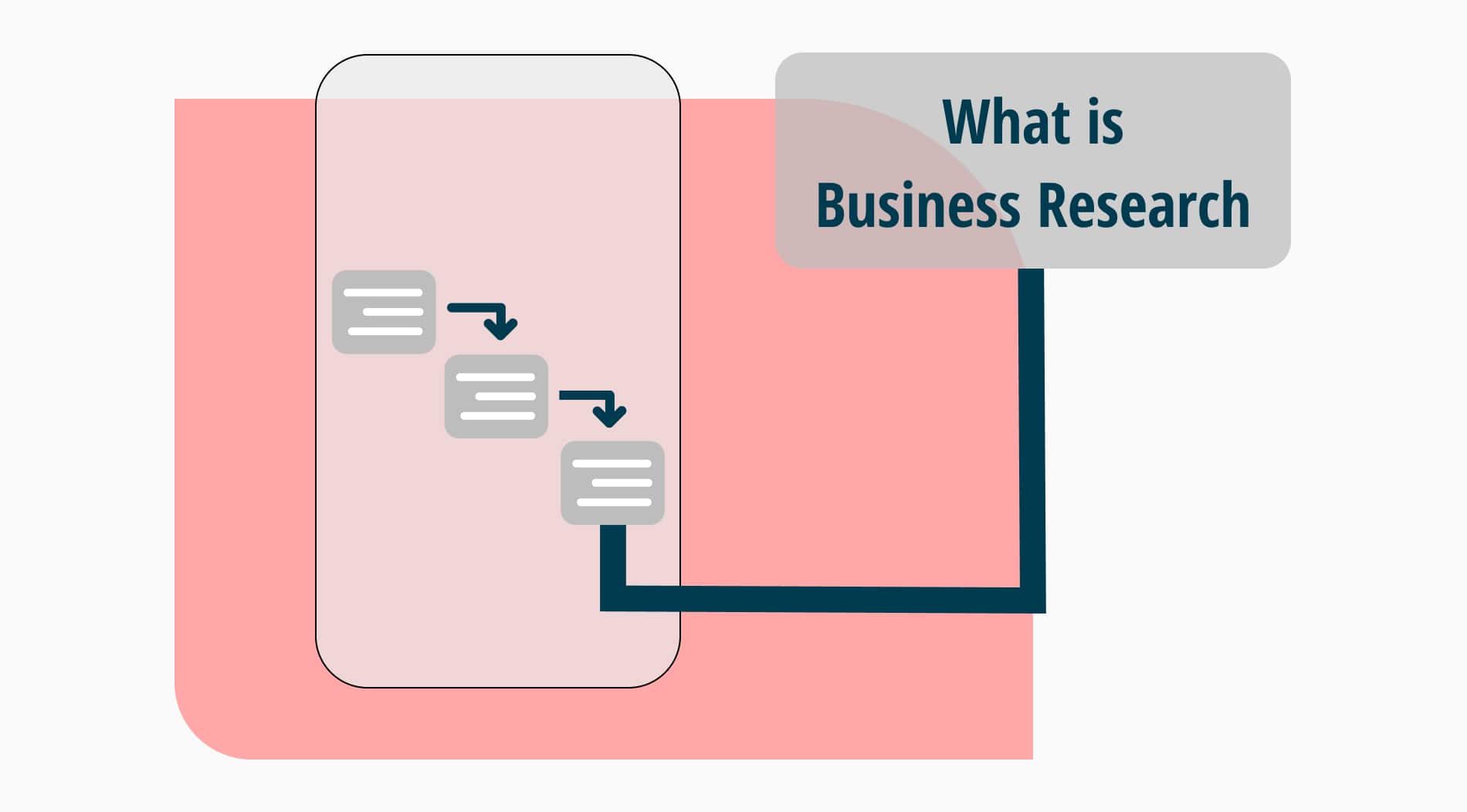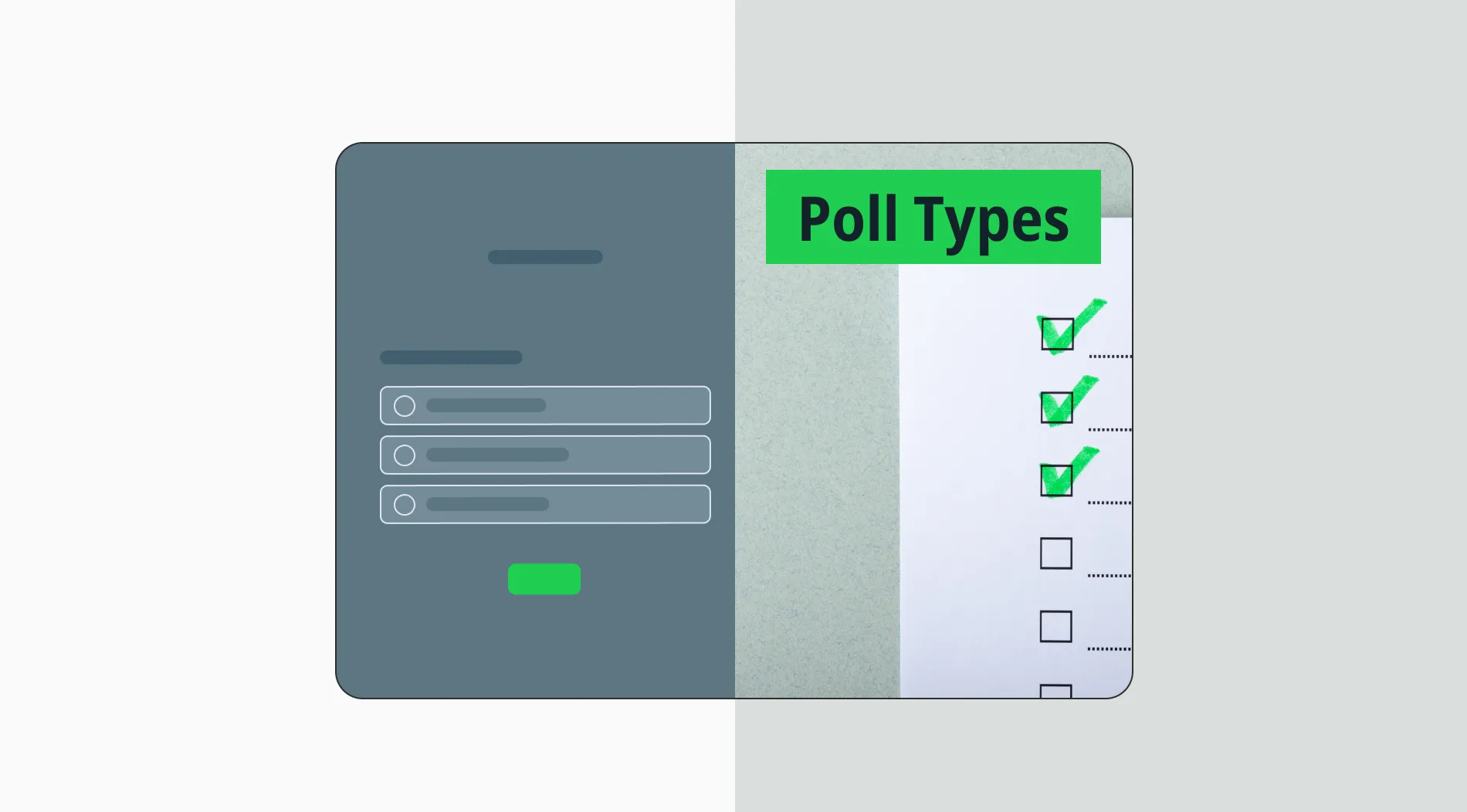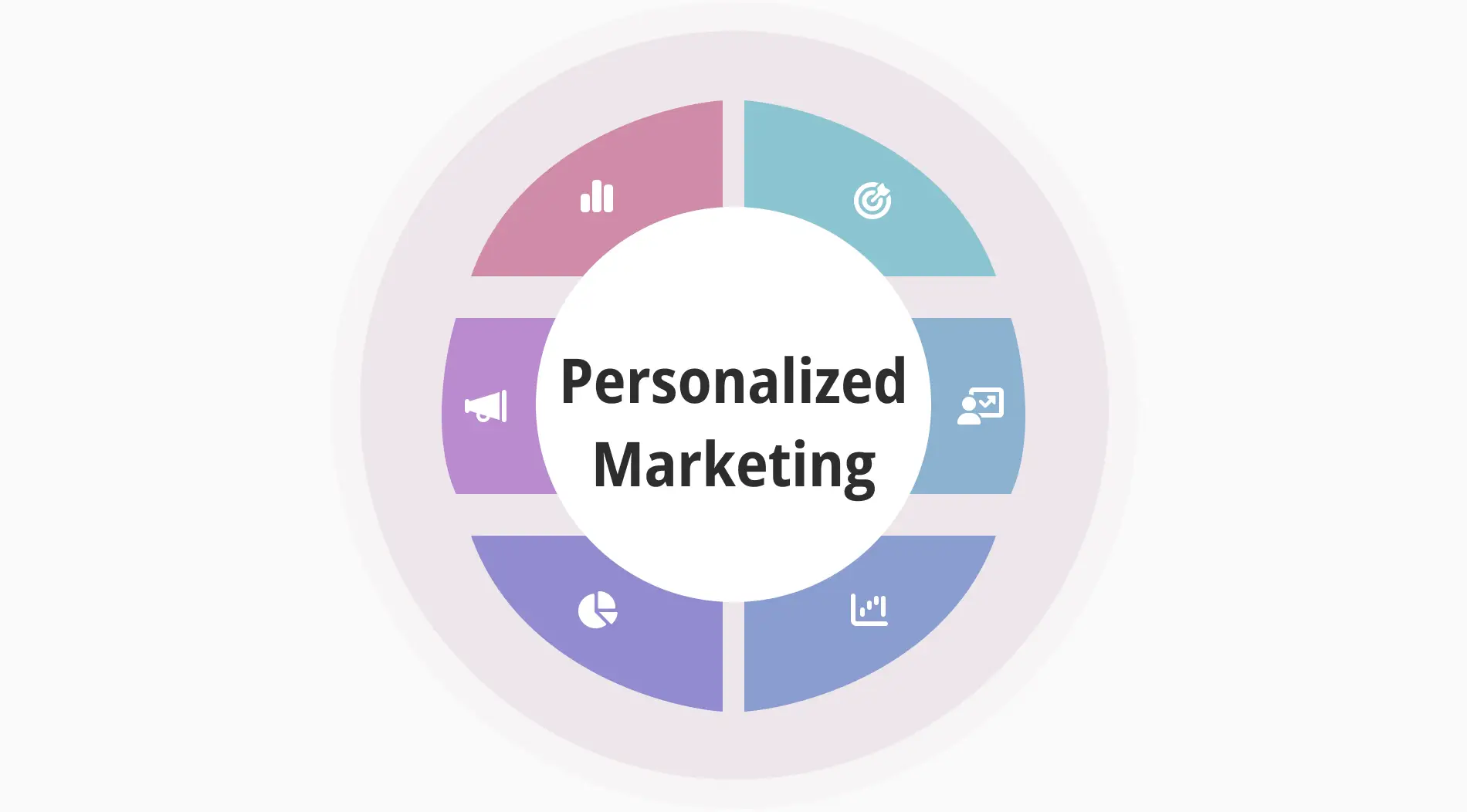Every business owner wants their company always to be successful and profitable. And even if you have a successful business plan, that does not mean things will not need changing in the future. And trial and error may not be on the table when you can not afford to lose money and precious customers. Therefore, you need to be cautious before taking any steps and do your research.
In this article, we explained business research, its methods, and types to help business owners and inform those interested to know more. We also added some examples of scenarios any company may face. Let us get started with the definition of business research!
What is business research?
Business research is a type of research process where the main goal is to help a company thrive and collect data about the target audience, potential business plans, and marketing strategies. The data collection about possible risks and investment opportunities helps business owners make informed decisions about future plans.
The fields that can use business research include marketing, business, education, and social science. But of course, they are not the only ones that can benefit from business research. It is a helpful research type for all business needs. Now, let us see how we can further categorize this into methods and types of business research.
Methods and types of business research
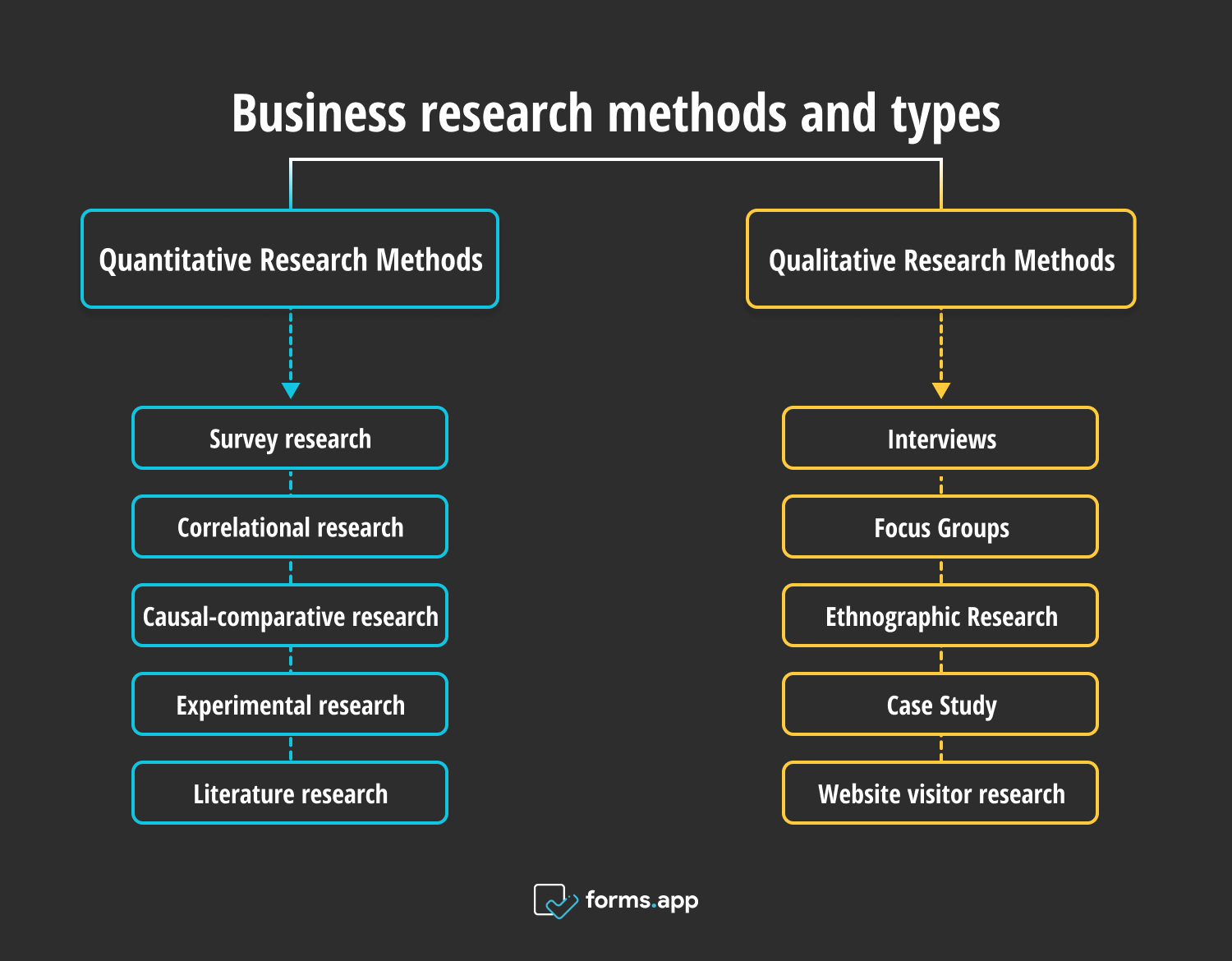
Business research methods and types
In business research methodology, there are two main types. These are quantitative research and qualitative research. In the simplest terms, quantitative research is about collecting numerical and factual data, whereas qualitative research is about collecting data by using open-ended questions. These two methods can be divided into more specific parts. Let us get started with quantitative research methods.
A. Quantitative Research Methods
Quantitative research methods give the researchers factual and numerical evidence that can be effectively used in decision-making processes. There are numerous ways to collect quantitative data, and it is also possible to use more than one method to prove the credibility of the information. Let us start with the first one:
1. Survey research
Surveys are a great way to collect information from a targeted group, no matter how big or small. They can be done in the format of an online survey, phone survey or questionnaire. Surveys are usually close-ended or multiple-choice questions that are easy to group and analyze. The business doing the research can collect valuable information directly from its customers.
2. Correlational research
Correlational research focuses on the discovery of whether two different entities influence each other in any way. The main focus of this research method is not to make decisions. But rather, they can use the findings to explore further using other research methods.
3. Causal-comparative research
Causal-comparative research is similar to correlational research in that both of them compare two different elements and how they affect each other. But the main difference is that fact the focus of this research method is to draw conclusions on the cause-and-effect relationship of said entities.
4. Experimental research
Experimental research has a broad spectrum when it comes to what is taken as ‘experimental’. Basically, it is when businesses want to test a specific theory about the quality of a product or service. There are many methods that can be used, and it is decided by the researcher according to the theory that will be tested.
5. Literature research
Literature research is a very effective and economical research method to use. It is about using offline and online existing literature and going through them to analyze the data. It is mostly used in sales about consumer behaviors.
B. Qualitative Research Methods
Qualitative research is not about numbers like quantitative research. Instead, it is about emotions, opinions, and approaches. The target audience can be presented with a topic through open-ended questions. There is more than one method to go with, and it is even possible to use multiple methods at once. Let us see qualitative research methods:
1. Interviews
The interview method is mostly done on a smaller participant group about a specific subject. They consist of open-ended questions and can be in a structured or unstructured format. Interviews are one-on-one questions asked to the target audience to gain insight into the problem.
2. Focus Groups
A focus group is a pre-determined group of individuals who are chosen to participate in a study to answer specific questions. The researchers present them with a topic and encourage discussions with open-ended questions. Then, the findings are generalized to make decisions.
3. Ethnographic Research
Ethnographic research is similar to conceptual research, and its main focus is to understand the culture and people of the target audience by using observation. This method is done by observing the people in their natural environment and seeing how they interact with one another and their surroundings.
4. Case Study
Businesses generally use a case study method to showcase to potential consumers how their product or service helped a certain individual or a group. It is a good way to attract new customers. This method helps highlight the company’s skill sets and assets.
5. Website visitor research
This research method is relatively newer than others. Its main focus is to collect feedback from individuals who use the company website and ask them about their opinions. A business can use this method by presenting a customer with a quick survey after their purchase on the website. Afterward, the company can improve user satisfaction by fixing existing problems.
Importance of business research
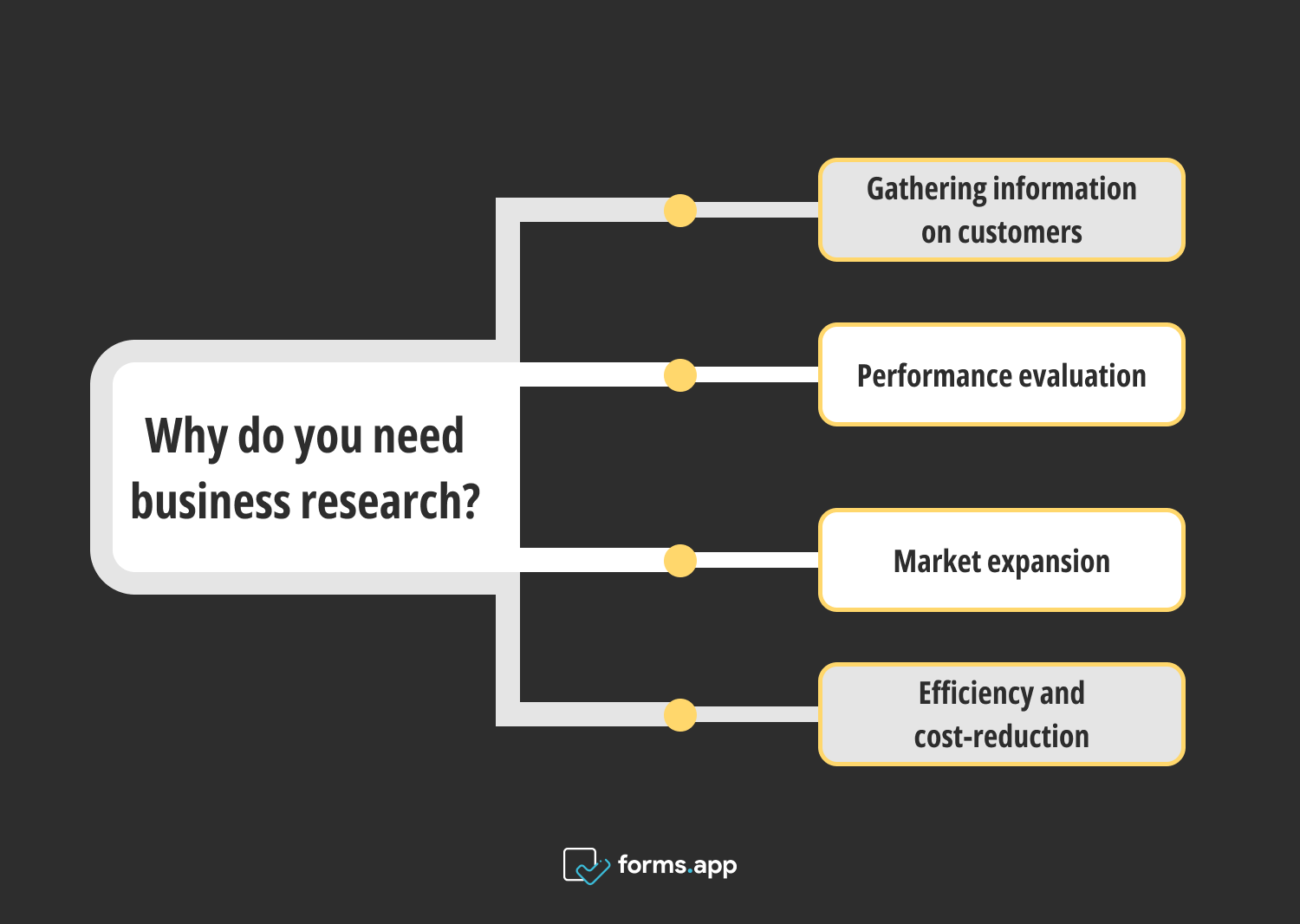
The reasons for conducting business research
Businesses grow by knowing their target market, potential customers, and competitors. And this is only possible by conducting market research to help make informed business decisions. The main goal of business research is to help stakeholders of the company make planned and informed decisions using the facts in the business research report. However, there are other reasons why business research is important. These are:
- Gathering information on customers: A business research report provides data on consumers’ behavioral changes, their needs, preferences, and expectations. The managers and stakeholders can make informed decisions with this knowledge.
- Performance evaluation: Research allows businesses to evaluate their success against industry standards and other competitors. This helps keep track while deciding how to differentiate themselves from others.
- Market expansion: Business research topics include areas that were not explored before. Therefore, when the business wants to expand to new markets, the research provides information on the market’s dynamics and potential risks and profits.
- Efficiency and cost-reduction: The data collected by business research helps identify any obstacles to productivity and cost excessiveness. That way, a more cost-effective and efficient approach can be taken.
Business research examples
Business research helps business managers make smart plans for the company and its future. They can make informed decisions about new marketing strategies, building new products or service branches, or improving customer satisfaction.
Business research example #1
Imagine a company making energy drinks wants to know if they can expand their market to the older part of the population. They do not know if they will be interested in their product or what kind of marketing strategies they can use to attract older people’s attention. They can make up a focus group and ask them about their opinions. The company can also conduct literature research to find out information about the competitors.
Business research example #2
Imagine a company that has a clothing store website wants to know if there is anything that makes shopping on their website difficult for customers. They can show a pop-up customer satisfaction survey and ask them if they can find what they are looking for easily and how the website visiting experience was. Then, they can collect customer feedback and see how they can improve their website to enhance customer satisfaction levels.
Frequently asked questions about business research
Much like every other research, business research is also best done when it is preplanned and organized. And there is a 4 stage plan of business research. These are:
1 - Defining the problem
2 - Designing the research plan
3 - Collecting data and making an analysis
4 - Reporting on the findings
The purpose of business research is to make sense of the existing elements of a business, such as consumers, product placement, marketing, innovation, etc. And using the data collected on these elements to make informed decisions and create smart business strategies to improve the success of the company.
Business research is best used when a new approach is taken or a new product is launched, and the risks need to be assessed. It is essential to be mindful of all the negative and positive sides of a new strategy without risking the entirety of the company.
Final words
When you own a business, no matter how big or small, change can be intimidating. You can not go to new territories blindly. But, you can not stay the same either. In order to keep your existing customers and find new potential ones, you should be mindful of their habits and opinions. The best way of doing this is either to ask them directly (using a survey, interviewing them, etc.) or to do your own research to draw conclusions.
In this article, we explained business research, quantitative and qualitative research methods, and business research types. We also included some examples of business research and what methods can be used for those problems. If you want to do your own business research but do not know where to start, you can check out quantitative research questions to get you started. Also, do not forget to check out other articles on research and so much more!
Defne is a content writer at forms.app. She is also a translator specializing in literary translation. Defne loves reading, writing, and translating professionally and as a hobby. Her expertise lies in survey research, research methodologies, content writing, and translation.
- What is business research?
- Methods and types of business research
- A. Quantitative Research Methods
- 1. Survey research
- 2. Correlational research
- 3. Causal-comparative research
- 4. Experimental research
- 5. Literature research
- B. Qualitative Research Methods
- 1. Interviews
- 2. Focus Groups
- 3. Ethnographic Research
- 4. Case Study
- 5. Website visitor research
- Importance of business research
- Business research examples
- Frequently asked questions about business research
- Final words
